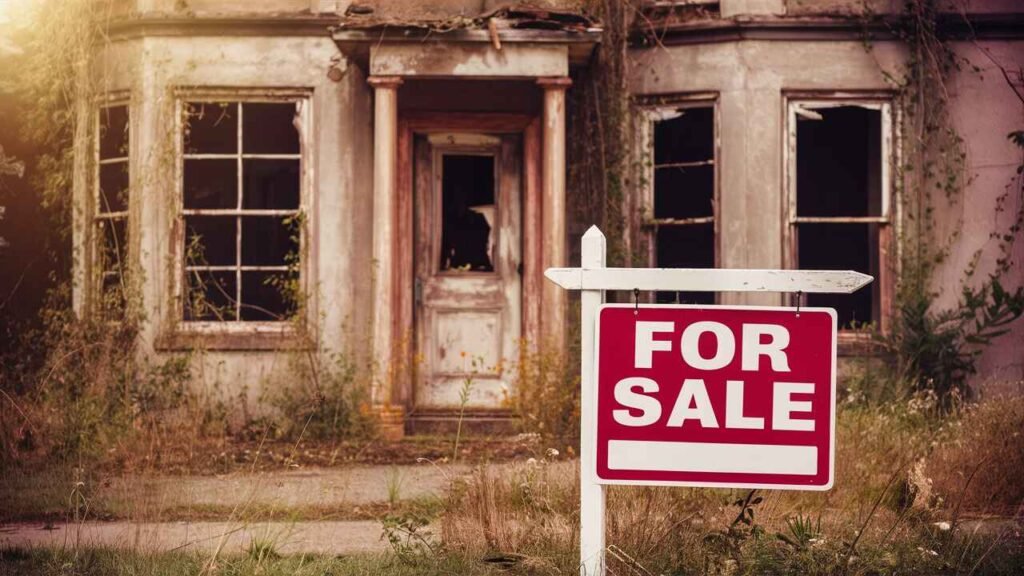Thinking about buying fixer upper for home? It could be a great way to snag a deal and create your dream place. With the federal housing administration‘s backing, you can land a mortgage that covers both the purchase a home and the home improvement costs. Remodel to your heart’s content, but remember, a house needs might be more than just cosmetic. It’s all about finding that balance between want to buy a fixer-upper and knowing when to hire a contractor.
Understanding the Basics: What Is a Fixer-Upper?
A fixer-upper is a type of home that requires significant repairs or renovations before it can be considered move-in ready. These homes are often priced lower than homes that aren’t in need of major work, making them an attractive option for first-time home buyers or those looking to save money on their purchase. However, the true cost of renovating a fixer-upper can be higher than anticipated, and the time and effort required can be substantial.
Defining a Fixer-Upper Home
A fixer-upper is a house that needs extensive repairs or renovations, from cosmetic updates to major structural work. These homes are typically priced lower than move-in ready properties, as buyers must factor in the cost of repairs and renovations to make the home livable.
Renovation Needs vs. Cosmetic Updates

Not all fixer-uppers are created equal. Some may only require cosmetic updates, such as new paint, flooring, or fixtures, while others may need major structural work, like a new roof, foundation repairs, or electrical and plumbing overhauls. Understanding the extent of the repairs needed is crucial when considering a fixer-upper.
Finding Your Ideal Fixer-Upper Property
Locating the right fixer-upper can be a challenge, as homes listed as fixer-uppers may vary greatly in the amount of work required. Conducting a thorough home inspection and researching the neighborhood are essential steps to finding a good fixer-upper that aligns with your budget and renovation goals.
The Financial Implications: Are Fixer-Uppers Really a Good Investment?
Buying fixer upper can be a financially savvy decision, but it’s important to carefully consider the costs involved. Calculating the true cost of renovation and understanding home equity potential post-renovation are crucial factors in determining if a fixer-upper is a good investment.
Calculating the True Cost of Renovation
The cost of repairs and renovations can quickly add up, often exceeding initial estimates. Hiring a home inspector and obtaining detailed quotes from contractors are essential steps to accurately budget for the project. Unexpected issues can also arise during the renovation process, further increasing the overall cost.
Home Equity Potential Post-Renovation

Investing in a fixer-upper can increase the value of your home significantly, allowing you to build equity more quickly. However, it’s important to avoid overvaluing the future home value, as the return on investment may not always be as high as expected.
Navigating Mortgage and Renovation Loan Options
Financing a fixer-upper can be a complex process, with options like FHA, Fannie Mae HomeStyle, and home equity line of credit available to help cover the costs. Understanding the pros and cons of each financing option is crucial to making the best decision for your home buying and renovation goals.
The Pros and Cons of Diving into a Fixer-Upper Project
Buying fixer upper can be a rewarding experience, allowing you to customize your home and potentially increase its value. However, the time and financial commitment required can be significant, and the risks of unexpected costs and delays should not be overlooked.
The Upside: Customization and Home Value Increase
Purchasing a fixer-upper gives you the opportunity to customize your dream home to your exact specifications. Additionally, investing in renovations can significantly increase the value of your home, allowing you to build equity more quickly.
The Downside: Unforeseen Costs and Time Commitment
Renovating a fixer-upper can be a time-consuming and expensive process, with unexpected issues often arising during the project. Underestimating the cost of repairs or overvaluing the future home value can lead to financial difficulties down the line.
When a Fixer-Upper Might Not Be for You
Fixer-uppers may not be the best option for everyone, particularly those who lack the time, resources, or DIY skills to manage a major renovation project. Buyers who prefer a move-in ready home or those with a limited budget may find traditional home purchases more suitable.
Key Steps in the Home Buying and Renovation Process
Purchasing and renovating a fixer-upper requires a carefully planned approach, from securing a comprehensive home inspection to choosing the right contractors and financing the project.

Securing a Home Inspection: What to Look Out For
Conducting a thorough home inspection is critical when buying fixer upper, as it can reveal hidden issues and help you estimate the true cost of repairs. Paying close attention to the home’s structure, plumbing, electrical, and other major systems can save you from costly surprises down the line.
Choosing the Right Contractors for Your Renovation Needs
Hiring experienced and reputable contractors is essential for successful fixer-upper renovations. Researching local contractors, checking references, and obtaining multiple quotes can help ensure the project is completed to your satisfaction and within budget.
Funding Your Fixer-Upper Dreams: FHA, Fannie Mae HomeStyle, and More
Financing a fixer-upper can be more complex than traditional home purchases, but options like FHA loans, Fannie Mae HomeStyle mortgages, and home equity lines of credit can provide the necessary funds to cover the renovation costs. Understanding the requirements and benefits of each financing option is crucial to securing the best deal.
Navigating the Maze: Tips for Buying Fixer Upper First Time For Home
Purchasing a fixer-upper for the first time can be a daunting experience, but with the right guidance and preparation, you can navigate the process and turn your dream home into a reality.
Why Working With a Real Estate Agent Specialized in Fixer-Uppers Pays Off
Partnering with a real estate agent who specializes in fixer-upper properties can be invaluable, as they can provide expert advice on identifying the right property, estimating renovation costs, and navigating the unique challenges of fixer-upper purchases.
The Importance of a Detailed Budget and Timeline
Creating a comprehensive budget and realistic timeline for your fixer-upper renovation is crucial to avoiding financial pitfalls and unexpected delays. Regularly reviewing and adjusting your budget and timeline as the project progresses can help you stay on track and minimize stress.
Avoiding Common Pitfalls: From Underestimating Costs to Overvaluing Future Home Value
Buyers of fixer-uppers often underestimate the true cost of repairs or overvalue the future home value, leading to financial difficulties down the line. Careful planning, thorough research, and realistic expectations are essential to avoiding these common traps.
Real Stories: Successes and Failures in Fixer-Upper Investments
Buying fixer upper can be a life-changing experience, but it’s important to learn from the successes and failures of others who have taken on similar projects.
Case Studies of Dream Homes Turned Reality
Some fixer-upper owners have transformed their properties into stunning, custom-designed homes, increasing the value and creating their dream living spaces. These success stories can inspire and guide prospective fixer-upper buyers.
Cautionary Tales: When Fixer-Uppers Become Money Pits
Unfortunately, not all fixer-upper investments turn out as planned. Buyers who underestimated the cost of repairs or encountered unexpected issues during the renovation process have often found themselves in financial trouble. These cautionary tales can help buyers avoid similar pitfalls.
What Successful Fixer-Upper Owners Wish They Knew Before Starting
Experienced fixer-upper owners often share valuable insights on what they wish they had known before taking on their renovation projects. Understanding these lessons can help prospective buyers make more informed decisions and prepare for the challenges ahead.
FAQs
Is Fixer-Upper a good investment?
Buying fixer upper can be a good investment if you carefully assess the costs, have the necessary skills or resources to manage the renovation, and are prepared for the time and financial commitment required. However, it may not be the best option for everyone, especially first-time home buyers or those with a limited budget.
What are the risks of buying a fixer upper?
The main risks of buying fixer upper include underestimating the cost of repairs, encountering unexpected issues during renovation, overvaluing the future home value, and the significant time and financial commitment required to complete the project. Buyers should carefully weigh these risks against the potential benefits before purchasing a fixer-upper.
Why no one wants a fixer-upper right now?
In the current housing market, buyers may be less inclined to purchase fixer-upper properties due to rising home prices, limited inventory of move-in ready homes, and economic uncertainties that make the financial commitment of renovating a fixer-upper seem riskier. However, for some buyers, a fixer-upper may still be an attractive option to get into the housing market and customize their dream home.
How do you determine if a fixer-upper is worth it?
To determine if a fixer-upper is worth it, buyers should carefully consider the cost of repairs, the potential increase in home value after renovations, their own skills and resources to manage the project, and the overall time and financial commitment required. A thorough home inspection, detailed contractor quotes, and research on comparable home values in the area can help inform this decision.


